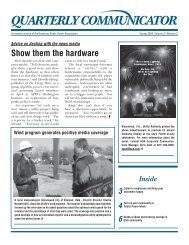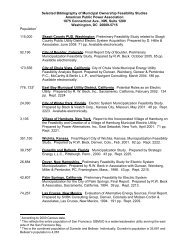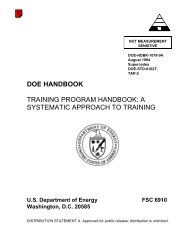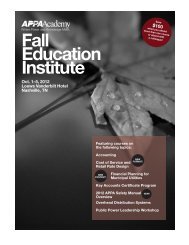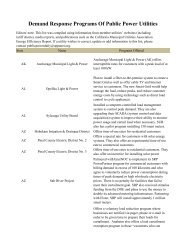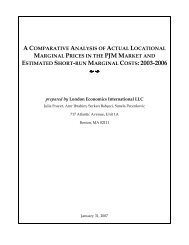Safeguarding Classified and Sensitive But Unclassified Information ...
Safeguarding Classified and Sensitive But Unclassified Information ...
Safeguarding Classified and Sensitive But Unclassified Information ...
You also want an ePaper? Increase the reach of your titles
YUMPU automatically turns print PDFs into web optimized ePapers that Google loves.
Granting a Security Clearance<br />
The sanctity of the classification program is dependent upon the suitability, integrity,<br />
trustworthiness, <strong>and</strong> reliability of the persons to whom access to classified information is granted.<br />
As such, prior to being granted access to classified information each person must be subjected to<br />
a background investigation, the results of the background investigation must be favorably<br />
adjudicated based on Federal adjudicative st<strong>and</strong>ards, <strong>and</strong> the security clearance formally issued<br />
to those persons deemed worthy of such trust. The level of security clearance granted,<br />
CONFIDENTIAL, SECRET, or TOP SECRET, is normally dependent upon the associated level of<br />
classified information a person will require access too <strong>and</strong> the favorable adjudication of an<br />
appropriate background investigation. The granting of a security clearance is a privilege – not a<br />
right.<br />
The granting of a security clearance by DHS to State, Local, Tribal, <strong>and</strong> Private Sector personnel<br />
will be limited to the SECRET level <strong>and</strong> based on a justified need that the person to whom the<br />
clearance is to be granted requires or will require access to classified information. When justified<br />
<strong>and</strong> when in support of the DHS mission, DHS will sponsor the initial granting of a security<br />
clearance to those personnel who currently do not have one. Contact your State Homel<strong>and</strong><br />
Security Advisor or Private Sector representative for additional guidance.<br />
If a person currently holds a security clearance granted by another Federal agency <strong>and</strong> requires<br />
access to classified information in support of the DHS mission then the security clearance<br />
granted by the other agency should be reciprocally transferred to DHS usually without the need<br />
for a new investigation. By doing so, DHS will simultaneously hold your clearance in conjunction<br />
with your original sponsoring agency. Holding a DHS-sponsored clearance provides a number of<br />
advantages to DHS as well as to State, Local <strong>and</strong> Private Sector personnel. This will allow the<br />
Department to provide you access to DHS classified meetings, equipment <strong>and</strong> systems at your<br />
appropriate clearance level without requiring yearly re-certification of your clearance status from<br />
your sponsoring agency. It will also reduce the vulnerability of inadvertent disclosures or<br />
compromise of classified information. Contact your State Homel<strong>and</strong> Security Advisor or Private<br />
Sector representative for additional guidance.<br />
<strong>Classified</strong> Discussions <strong>and</strong> Meetings<br />
Special care must be taken when discussing classified information in the workplace. The capability<br />
<strong>and</strong> the authority to have classified discussions within facilities under the jurisdiction of State, Local,<br />
Tribal, <strong>and</strong> Private Sector entities is strictly limited to rooms/areas that have been subjected to a<br />
survey by appropriate Federal authorities. For example, a private office that has been surveyed <strong>and</strong><br />
approved by a Federal authority for the installation of a secure telephone can of course be used for<br />
classified discussion. However, when classified discussions occur either through the use of secure<br />
telephone or in face to face meetings, it is incumbent upon the participants to:<br />
• Ensure the security clearances of participants are at least equal to the level of classified<br />
information to be discussed.<br />
• Ensure all electronic equipment maintained in the room that is capable of transmitting<br />
signals outside the room is powered off, i.e., cell phones, PDAs, <strong>and</strong> blackberries.<br />
• Ensure normal conversation taking place inside the room/area can not be heard outside of<br />
the room/area.<br />
12






